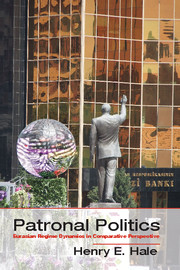Book contents
- Frontmatter
- Contents
- List of Figures
- List of Tables
- Acknowledgments
- Note on Transliteration
- 1 Introduction
- 2 Patronal Politics and the Great Power of Expectations
- 3 Eurasian History as Patronal Politics
- 4 Constitutions, Elections, and Regime Dynamics
- 5 The Emergence of Networks and Constitutions
- 6 The Building of Eurasia’s Great Power Pyramids
- 7 Revolutions and Other Presidential Ousters
- 8 Nonrevolution in Post-Soviet Presidential Systems
- 9 After Revolution
- 10 Patronal Parliamentarism
- 11 Explaining Post-Soviet Regime Dynamics
- 12 Patronal Politics in Global Comparative Perspective
- References
- Index
- References
1 - Introduction
Published online by Cambridge University Press: 05 November 2014
- Frontmatter
- Contents
- List of Figures
- List of Tables
- Acknowledgments
- Note on Transliteration
- 1 Introduction
- 2 Patronal Politics and the Great Power of Expectations
- 3 Eurasian History as Patronal Politics
- 4 Constitutions, Elections, and Regime Dynamics
- 5 The Emergence of Networks and Constitutions
- 6 The Building of Eurasia’s Great Power Pyramids
- 7 Revolutions and Other Presidential Ousters
- 8 Nonrevolution in Post-Soviet Presidential Systems
- 9 After Revolution
- 10 Patronal Parliamentarism
- 11 Explaining Post-Soviet Regime Dynamics
- 12 Patronal Politics in Global Comparative Perspective
- References
- Index
- References
Summary
Elections are civil war fought by nonviolent means. If some countries resolve their domestic disputes on the battlefield, others wage their wars on the stump and through the ballot box. The latter wars are no less real. Campaigns are launched, battle lines drawn, foot soldiers mobilized, flags flown, allies sought, passions inflamed, and victories won. Elections in many countries often have a special whiff of war, sitting precariously near the wrong end of the continuum between violence and nonviolence. There, tanks may not roll and guns may not fire, but other means of coercion replace them as keys to victory, frequently finding their way into the arsenals of at least one side.
This is not the face of “democracy” as typically depicted in American textbooks, but the United States’ own history illustrates the point quite well. Early American elections – especially with the advent of industrialization – were as much the preserve of the political machine as issue politics, of the company town as the town assembly. Large segments of the population were denied the vote one way or another straight through to the Civil Rights Act of 1965 in some places, while in others even the dead lingered long on voter lists, posthumously casting ballots for those who controlled the rolls. In Frank Capra’s famous 1939 film, the upright Mr. Smith who went to Washington was the exception to the Taylor machine’s sorry rule. Taylor was fictional, but characters ranging from William (“Boss”) Tweed to Huey Long to the senior Richard Daley were decidedly not. In fact, it might be fair to say that the most common world historical experience with elections has been of this more coercive sort, not the idealized version taught in schools and fought for by student activists.
- Type
- Chapter
- Information
- Patronal PoliticsEurasian Regime Dynamics in Comparative Perspective, pp. 1 - 18Publisher: Cambridge University PressPrint publication year: 2014
References
- 1
- Cited by



